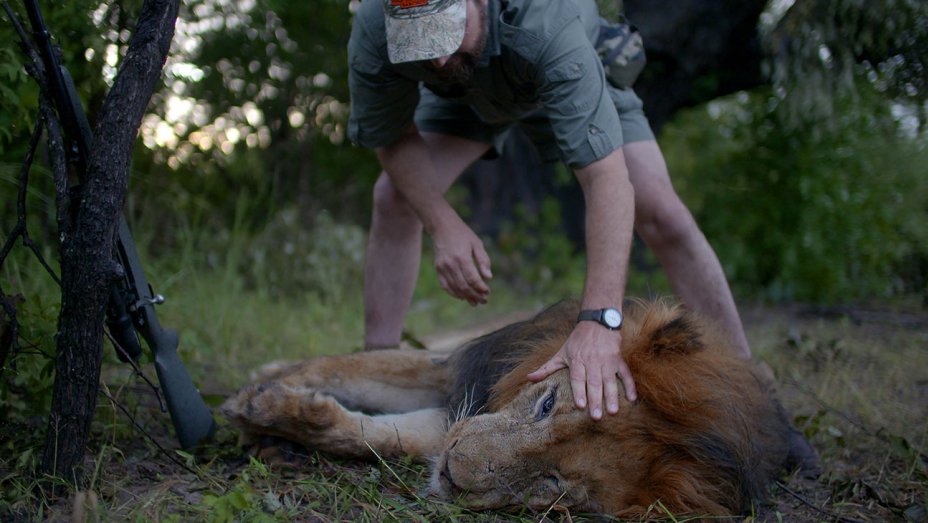The Hollywood Reporter
'Trophy': Film Review | Sundance 2017
1:28 PM PST 1/21/2017 by John DeFore
Courtesy of Sundance Film Festival
A thought-provoker, likely to leave viewers less sure of their opinions than they were going in. TWITTER
Shaul Schwarz ('Narco Cultura') meets hunters and preservationists in a complex doc about how to handle endangered species.
A hunter shoots a huge rhinoceros, and within seconds a team descends on it, whipping out a power saw to remove both the beast's horns. They're the bad guys, right?
Not so fast, says Shaul Schwarz's complex doc
Trophy, which argues that this action has just bought two years of life for the animal, who was only drugged long enough to make it worthless to the poachers who would slaughter it. There's more to the story than that, and
Trophy isn't as good at drawing moral conclusions as it is at laying out the difficult issues around hunting, conservationism, and trade in animal parts. But the film will be involving for those on all sides of animal-welfare debates, and could do respectable niche-theatrical business before finding a larger audience on video.
That rhino operation is run by one of the film's main subjects, John Hume, whose Buffalo Dream Ranch in South Africa, home to 1,500 rhinos, tries to breed 200 new ones each year. Hume claims that his goal is to reestablish the endangered species (we're told that 500,000 rhinos roamed the earth in 1900, down to 30,000 today), keeping them safe from poachers hoping to sell their horns. (More valuable by weight than gold or heroin, the horn is believed in much of the world to have aphrodisiac and other medical properties.)
Only late in the film do we see how reviled Hume is by many animal-rights activists. In the debate between these two camps, the film leaves viewers to ask for themselves whether Hume's professed goal is just a high-minded justification for his real motivation, to make tens of millions of dollars off the horn he has harvested.
We're left to read between the lines on other fronts as well. Schwarz spends lots of time with a Texas sheep rancher named Philip Glass, a lifelong hunter who talks of his deep love and respect for the animals he kills. Some of the things Glass says (about the Bible's declaration that humans should "have dominion" over animals; about the "fools" who believe in evolution) will push the buttons of many urban lefties, making it impossible to see any good in him.
But reflexively damning him will keep viewers from the more fascinating task of plumbing his psyche: Glass is clearly a man with sincere moral beliefs, and one who understands the natural world in a first-hand way few of his critics could match. Hunting has been part of his life, though, since long before he was capable of moral reasoning: When he speaks of how his stern-sounding father drilled hunting into him, or recalls his first experience of killing a beautiful redbird, a generous viewer may feel for him, marveling at the way love for animals can be perverted into this desire to possess them.
Other hunters seen here are easier to condemn, paying exorbitant amounts to shoot magnificent beasts in cages. But the film is short on unambiguous good or bad guys. Chris Moore, for instance, leads a vigorous anti-poaching campaign in Zimbabwe, trying to protect elephants. But Schwarz again withholds information for dramatic effect, revealing only near the end that Moore works with hunters, earning fees from them that support his squad's larger conservation efforts. "It just comes back to control" of the number of animals killed, he says, arguing that "poachers will shoot every last one" of the country's animals if they can, while hunting outfits obey the limits governments set.
That may be true. Still, it makes one queasy to see this white man lead raids on impoverished villages, threatening local black poachers with violence, while working with the rich white foreigners who visit Zimbabwe hoping to take back new decorations for their McMansions. There's too much moral ambiguity here for one doc to make sense of it all, but
Trophy certainly offers much to think about.
Distributors: The Orchard, CNN
Production companies: Impact Partners, Pulse Films, Reel Peak Films, The Long Run
Director: Shaul Schwarz
Producers: Lauren Haber, Julia Nottingham
Executive producers: Sharon Chang, Lilly Hartley, Jeffrey Tarrant, Maxyne Franklin, Kate Townsend, Victoria Steventon, Lars Knudsen, Tom Hardy, Dean Baker, Dan Cogan, Thomas Benski, Lucas Ochoa
Directors of photography: Christina Clusiau, Shaul Schwarz
Editors: Halil Efrat, Jay Arthur Sterrenberg
Composers: Jeremy Turner, Erick Lee
Venue: Sundance Film Festival (U.S. Documentary Competition)
Sales: Submarine, UTA
109 minutest














